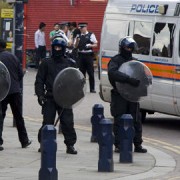
Parking fines issued using CCTV cameras are a big source of income for local councils. Pic: Mike Fleming
CCTV ‘spy’ cameras aimed at catching and fining motorists who commit traffic violations could be banned across the UK in the coming month.
Last year alone, motorists in Croydon received almost 108,500 penalty charge notices (PCNs), with Hackney receiving 104,832, Lewisham 62,636, and Tower Hamlets 117,002.
Eric Pickles, Secretary of State for Communities and Local Government, announced that he wanted to rein in “over-zealous and unfair rules on parking enforcement” in an attempt to rejuvenate high streets, which are suffering from
the lack of people wanting to risk the fines.
Pickles also said that his office are aiming to ensure that “parking strategies complement and enhance the attractiveness of our high streets and town centres” and have recently held a public consultation on local authority parking strategies.
Brandon Lewis, Parliamentary Under-Secretary of State at the Department for Communities and Local Government (DCLG), has dubbed local authorities’ CCTV as “Stasi” surveillance. He said: “Public confidence is strengthened in CCTV if it is used to tackle serious crime, not to raise money for town halls by penalising parents dropping off kids on the school run.”
He added: “They undermine natural justice, as car owners receive the fine weeks later in the post making it extremely hard to challenge on appeal. Nothing we are proposing to do will prevent a parking warden or police officer issuing a penalty notice in the case of genuinely dangerous parking.”
The local council’s representative body, The London Government Association, has argued against the proposed reforms of banning CCTV parking cameras, saying that it could put children at risk, impose significant costs on businesses and the tax payer, and increase congestion.
The Local Government Information Unit has also stated that the criticism given by Pickles and his office is unfair, as their research suggests a different reality.
They said: “Rather than using traffic enforcement powers as a ‘cash cow’, 3 in 10 councils said that the revenue raised did not cover the costs of enforcement, and a further 5 in 10 authorities stated it just covered costs. Only 2 in 10 councils reported making surplus income.”
Hackney Council have also rejected the claims that they have acted unlawfully. Councillor Feryal Demirci, Hackney Council’s Cabinet Member for Neighbourhoods, said: “The council made £4.9 million surplus in parking in 2012/13, not the £17.2 million that is being reported as being brought in by parking fines. This surplus, combined with other income, was used to help cover the cost of concessionary travel for older and disabled residents, into which
Hackney invested £11.2 million in total.”
She added: “Unfortunately the figures referred to by DCLG and relayed on by Brandon Lewis are inaccurate and provide, in the case of Hackney, a misleading picture of parking to our residents, businesses and users. The figures could infer that councils are acting unlawfully and profiting from parking controls, which is incorrect and does nothing to address the real concerns our residents have about parking on their streets and in their neighbourhoods.”
Tower Hamlets council has also defended the use of CCTV as: “vital to ensuring road safety outside schools, at bus stops and other locations where pedestrians come in to close contact with vehicles at the roadside such as busy shopping areas and main roads.”
A spokeswoman from the council said: “Many of the difficulties we face stem from the fact that effective enforcement in such places would require an officer to be present at each location during the hours of operation, whereas CCTV cameras can monitor multiple locations at once, providing a better deterrent.”
She added: “In some areas, our community is currently calling for more CCTV parking enforcement as a result of certain cab and car hire firms employing spotters to warn their drivers of a CEO’s approach and subsequently providing the all clear after they have left, to the detriment of other local businesses and residents.”
The spokeswoman denied the claims made by Lewis that councils are using parking enforcement to boost revenue and that banning CCTV cameras would: “Substantially increase the costs of parking enforcement”.
The DCLG states that local authorities issue over 8 million parking fines and parking tickets each year with the total income from parking in England rising from £608 million in 1997 to 1998, to £1.3 billion in 2010 to 2011. Net income from local authority parking services is also expected to rise this year by 5.6 per cent, from £601 million, last year, to £635 million.
Official figures show that councils which use CCTV to enforce parking rules made £43.95 per household last year, which is nearly nine times more than authorities which do not use them at all.




